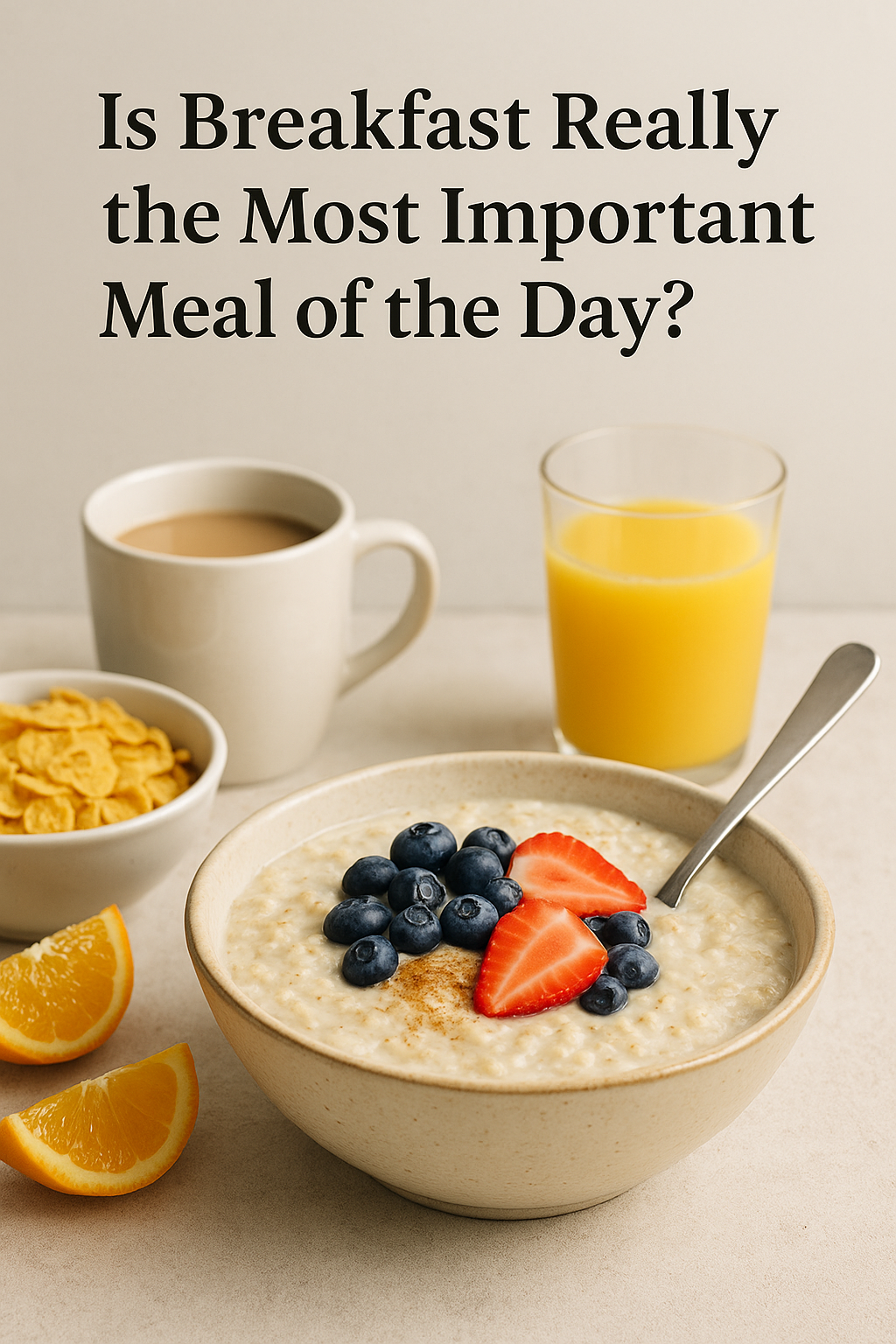
Is Breakfast Really the Most important Meal of the Day?
Share
For decades, we’ve heard it: "Breakfast is the most important meal of the day." It’s a phrase as familiar as the sound of the kettle boiling in the morning. But where did this idea come from? And does it truly hold up under scientific scrutiny?
A Catchy Mantra — With a Corporate Origin
The idea that breakfast is essential didn't originate in nutritional science. It can be traced, in part, to a clever marketing campaign. In the early 20th century, cereal companies like Kellogg’s and General Foods were instrumental in cementing breakfast as a “must.” John Harvey Kellogg, a physician and devout Seventh-day Adventist, promoted cereal as a wholesome, moral choice — a plant-based antidote to the supposedly corrupting influence of meat-heavy breakfasts [1].
Later, in the 1940s and 50s, advertising campaigns leaned into the phrase "the most important meal of the day," turning it into an unchallenged dietary doctrine. While these early campaigns may have been based on reasonable assumptions (like the benefit of starting the day with food energy), they were ultimately crafted to sell cereal — not to communicate evidence-based health advice.
What the Science Actually Says
More recently, nutritional science has sought to test this assumption with more rigour. Some studies do show that breakfast eaters tend to have better overall health outcomes. For instance, habitual breakfast consumption has been associated with improved cognitive function [2], better glycaemic control [3], and lower risk of obesity and cardiovascular disease [4].
Mechanistically, there are plausible explanations. Eating earlier in the day aligns better with our circadian rhythms — our body's natural 24-hour clock — which tends to favour daytime digestion and insulin sensitivity [5]. People who eat breakfast often report lower levels of hunger throughout the day and may be less likely to overeat at night [6].
However, this evidence is not as straightforward as it seems. Much of it comes from observational studies, which can’t fully separate cause from correlation. Breakfast eaters, for example, may also have healthier lifestyles overall: they might exercise more, sleep better, or eat fewer ultra-processed foods [7].
The Rise of Intermittent Fasting — and the Reframing of Breakfast
In contrast to the breakfast-every-day model, intermittent fasting (IF) has grown in popularity, with practices like time-restricted eating (TRE) — where one eats only within a limited window of time each day — showing metabolic benefits. Some forms of IF involve skipping breakfast entirely and eating meals later in the day, often from noon to 8 p.m.
These approaches have shown promising effects on insulin sensitivity, fat loss, and inflammation markers — even when calorie intake is kept the same [8, 9]. This challenges the notion that skipping breakfast is inherently unhealthy.
But emerging evidence suggests that the timing of food intake — not just whether you eat breakfast — may be the key factor.
Front-Loading Calories: The Ruddick-Collins et al. (2022) Study
A notable study by Ruddick-Collins and colleagues (2022), published in Cell Metabolism, examined how the timing of calorie intake affects appetite, energy metabolism, and weight regulation in people with obesity. Participants ate the same number of calories per day but were split into two groups: one consumed most of their calories in the morning ("early loading") and the other in the evening ("late loading") [10].
Surprisingly, despite different eating schedules, there was no significant difference in energy expenditure or weight loss between the two groups. However, those who ate more in the morning reported lower levels of hunger and a stronger sense of satiety throughout the day. This suggests that while calorie timing may not alter your metabolism, it does influence how hungry you feel — which can affect food choices, snacking, and overall eating behaviour.
Breakfast and the Gut Microbiome
Beyond energy and appetite, another crucial lens through which to view breakfast is gut health. The trillions of microbes that inhabit our digestive tract — collectively known as the gut microbiome — are highly sensitive to when and what we eat. Some research suggests that regular eating patterns, including breakfast, help stabilise the microbial environment by reinforcing circadian rhythms in the gut [11]. Disruptions to these rhythms — through erratic eating or late-night snacking — can impair microbial diversity, which is associated with poorer metabolic and immune health [12]. Interestingly, intermittent fasting may also benefit the microbiome, but likely via a different mechanism: by providing the gut time to rest and repair during the fasting window, it may enhance mucosal integrity and promote bacterial balance [13]. There may also be sex-based differences in response to meal timing. Emerging evidence indicates that women may experience stronger hormonal and metabolic benefits from eating earlier in the day, potentially due to interactions between circadian biology and female reproductive hormones [14]. While more research is needed, especially in diverse populations, it appears that breakfast can play a supportive role in gut health — particularly when it includes fibre-rich, plant-based foods that fuel beneficial gut bacteria.
So, Is Breakfast the Most Important Meal?
The answer is: it depends — on your lifestyle, health goals, and daily routine.
-
If you're aiming to reduce hunger, improve appetite control, or align with circadian rhythms, eating a substantial breakfast may be helpful.
-
If you're practicing intermittent fasting or simply not hungry in the morning, skipping breakfast is does not appear to be harmful, as long as your overall nutrient intake is balanced.
-
What matters more than when you eat is what you eat — whole foods, adequate fibre, and a variety of plant-based nutrients tend to support gut health and overall wellbeing far more than the clock alone.
Final Thoughts
Breakfast’s crown as the “most important meal of the day” may have been placed by cereal companies, but modern science gives it a more nuanced role. It can be important — but not universally so. The emerging message is clear: listen to your body, follow the science, and don’t be afraid to question long-held food rules.
References
-
Watson, J., 2014. Cerealizing America: The Unsweetened Story of American Breakfast Cereal. Beacon Press.
-
Adolphus, K., Lawton, C.L. and Dye, L., 2013. The effects of breakfast on behavior and academic performance in children and adolescents. Frontiers in Human Neuroscience, 7, p.425.
-
Jakubowicz, D. et al., 2013. High-energy breakfast with low-energy dinner decreases overall daily hyperglycemia in type 2 diabetic patients: a randomized clinical trial. Diabetologia, 56(5), pp. 1126–1135.
-
Mekary, R.A. et al., 2013. Eating patterns and type 2 diabetes risk in men: breakfast omission, eating frequency, and snacking. The American Journal of Clinical Nutrition, 98(3), pp. 682–689.
-
Morris, C.J., Yang, J.N. and Scheer, F.A.J.L., 2012. The impact of the circadian timing system on cardiovascular and metabolic function. Progress in Brain Research, 199, pp. 337–358.
-
Farshchi, H.R., Taylor, M.A. and Macdonald, I.A., 2005. Deleterious effects of omitting breakfast on insulin sensitivity and fasting lipid profiles in healthy lean women. The American Journal of Clinical Nutrition, 81(2), pp.388–396.
-
Betts, J.A., Richardson, J.D., Chowdhury, E.A., Holman, G.D., Tsintzas, K. and Thompson, D., 2014. The causal role of breakfast in energy balance and health: a randomized controlled trial in lean adults. The American Journal of Clinical Nutrition, 100(2), pp.539–547.
-
Sutton, E.F. et al., 2018. Early Time-Restricted Feeding Improves Insulin Sensitivity, Blood Pressure, and Oxidative Stress Even without Weight Loss in Men with Prediabetes. Cell Metabolism, 27(6), pp.1212–1221.e3.
-
Antoni, R., Johnston, K.L., Collins, A.L. and Robertson, M.D., 2017. Effects of intermittent fasting on glucose and lipid metabolism. Proceedings of the Nutrition Society, 76(3), pp.361–368.
-
Ruddick-Collins, L.C. et al., 2022. Timing of daily calorie loading affects appetite and hunger responses without changes in energy metabolism in healthy subjects with obesity. Cell Metabolism, 34(10), pp.1472–1485.e5.
-
Zarrinpar, A., Chaix, A., Yooseph, S. and Panda, S., 2014. Diet and feeding pattern affect the diurnal dynamics of the gut microbiome. Cell Metabolism, 20(6), pp.1006–1017.
-
Thaiss, C.A., Zeevi, D., Levy, M. et al., 2014. Transkingdom control of microbiota diurnal oscillations promotes metabolic homeostasis. Cell, 159(3), pp.514–529.
-
Crosby, L. et al., 2022. Intermittent fasting and the microbiome: A review. Nutrients, 14(3), p.490.
-
Regmi, P. and Heilbronn, L.K., 2020. Time-restricted eating: benefits, mechanisms, and challenges in translation. iScience, 23(6), p.101161.
